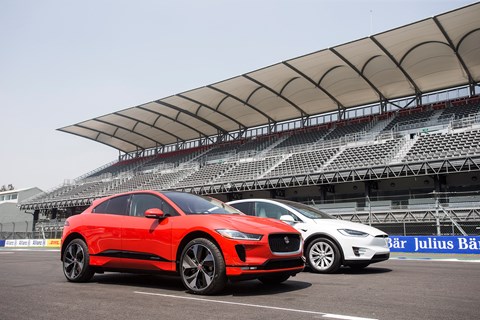► Jaguar and BMW electric car plan
► Collaboration to develop e-motors
► Working together on next EVs
Jaguar Land Rover and BMW have announced a surprise collaboration to co-develop the next generation of electric drive systems, including the motors and control software that operate them. Both companies have established creds in the area, with pioneering products such as the i3, i8 and i-Pace leading the charge to battery-powered vehicles.
It’s a sign that even the world’s biggest car makers can’t do this electrification thing on their own; such is the scale of the transformation required, they can share costs and pool knowledge better by working together.
The announcement revealed the two groups would jointly invest in research and development, engineering and procurement. No financial terms of the deal have been announced.
Revealed: the best electric cars and EVs on sale today
Nick Rogers, Jaguar Land Rover engineering director said: ‘The transition to Autonomous, Connected, Electric and Shared (ACES) represents the greatest technological shift in the automotive industry in a generation. The pace of change and consumer interest in electrified vehicles is gathering real momentum and it’s essential we work across industry to advance the technologies required to deliver this exciting future.

‘We’ve proven we can build world beating electric cars but now we need to scale the technology to support the next generation of Jaguar and Land Rover products. It was clear from discussions with BMW Group that both companies’ requirements for next generation EDUs to support this transition have significant overlap making for a mutually beneficial collaboration.’
What does the BMW-Jaguar Land Rover electric car project mean?
Engineers in England and Germany will share their knowledge in developing electric drive units – the e-motors and software that power electric cars. By pooling their resources, both brands will ‘take advantage of efficiencies arising from shared research and development and production planning as well as economies of scale from joint procurement across the supply chain.’
Yep, it’s about saving money. But each brand is adamant they will retain brand differntiation, ‘to deliver the specific characteristics required for their respective range of products.’ It’s no different to how BMW and Toyota have shared engines in the past decade, for instance.
Each manufacturer will build their own electric drive systems – in Wolverhampton for Jaguar and Land Rover, and Munich for BMW’s.
Could this deal spark further collaboration between the two car makers? We’d say it’s likely. An official told us: ‘We are collaborating with BMW on powertrain technologies, but beyond the EDU [electric drive unit] collaboration we have nothing further to say.’
Further electric car reading